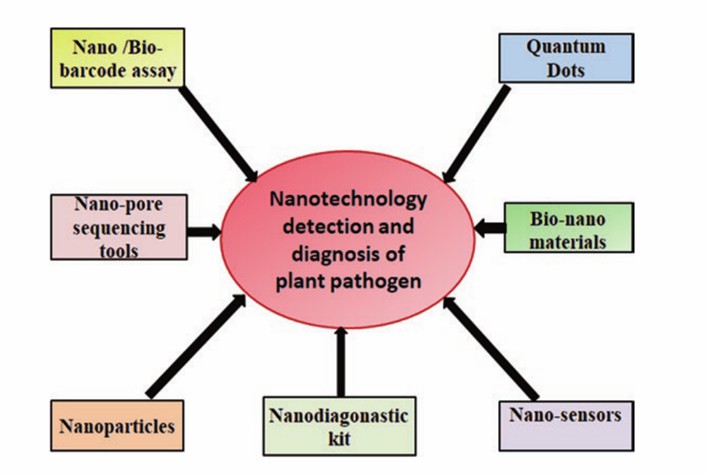Lifeasible focuses on the application of nanotechnology in plant protection and provides services to help develop nanomaterials related to diagnosing plant diseases.
Nano-phytopathology is a discipline with nano-based applications in the initial stages of detection, diagnosis, and control of plant diseases. Information from nano-phytopathology can be used to diagnose and monitor the characteristics of plant diseases, diagnose pathogenic toxins, assess environmental friendliness, and detect interactions between host and pathogenic microbes. Identifying, profiling, and controlling plant diseases at their early stages is a more economical approach to plant protection. Nanotechnology-based diagnostics are fast and highly sensitive and can be used for early plant disease diagnosis for more economical plant protection control. In addition, nanotechnology-based biological barcoding technology has a high sensitivity for protein and DNA detection. Barcode-based technology can be used to develop kits for rapid and in situ detection of plant diseases. Overall, nanotechnology has multiple applications in plant diagnostics (Fig. 1).
 Fig. 1 Effect of different nanotechnology approaches for detection and diagnosis of plant pathogens (Younas et al., 2020).
Fig. 1 Effect of different nanotechnology approaches for detection and diagnosis of plant pathogens (Younas et al., 2020).
Nanotechnology has broad applications in plant disease process detection and monitoring, and it is beneficial to play these applications well to enhance the protection of plants. We provide three services to help realize the application of nanotechnology in plant disease detection and monitoring.
Development of nano assay kits
We help develop nanotechnology-based assay kits to detect plant pathogenic bacteria, fungi, and viruses. We help design assay kits mainly using barcoding technology. We help design kits using a variety of nanoparticles, including magnetic nanoparticles, gold nanoparticles, and gold-magnetic nanoparticles. We can perform various chemical surface modifications on the above nanoparticles to ensure the design of efficient assay kits. We mainly use covalent binding to bind nanoparticles to antibodies or probe nucleic acids, and this design allows for more stable binding.
Development of nano-sensors
Biological nano-sensors prepared have the advantage of high sensitivity and real-time monitoring properties. We offer services to help design customized biological nano-sensors for plant monitoring. We help selectively design genetically encoded sensors, nanomaterial, and wearable nano-sensors for different disease monitoring needs. For example, we design wearable nano-sensors to detect volatile molecules produced by plants. Our commonly used nanomaterials for designing nano-sensors include carbon-based nanomaterials, quantum dots-based nano-sensors, and fluorescence resonance energy transfer (FRET)-based nano-sensors.
Optimization of existing sensors
The effectiveness of the same nano-sensors varies significantly between different plant species. To achieve more accurate monitoring, the nano-sensors need to be optimized specifically. Lifeasible offers sensor optimization services for different plants to help adjust the detection accuracy of the sensor and to help achieve accurate monitoring of the plant's disease process.
Lifeasible facilitates the application of nanotechnology in plant disease diagnosis and plant disease monitoring. We provide pathogen nano assay kit development services to help detect plant diseases in their early stages. We provide nano-sensor development services for monitoring plant interactions with pathogenic microorganisms or viruses, plant response to environmental stresses, and plant health status. We also offer optimization services for nano-sensors for more accurate plant monitoring. Contact us for custom plant disease nano assay kits and plant monitoring nano-sensors.
References
Lifeasible has established a one-stop service platform for plants. In addition to obtaining customized solutions for plant genetic engineering, customers can also conduct follow-up analysis and research on plants through our analysis platform. The analytical services we provide include but are not limited to the following:
Get Latest Lifeasible News and Updates Directly to Your Inbox
Adaptive Evolutionary Mechanism of Plants
February 28, 2025
Unraveling Cotton Development: Insights from Multi-Omics Studies
February 27, 2025